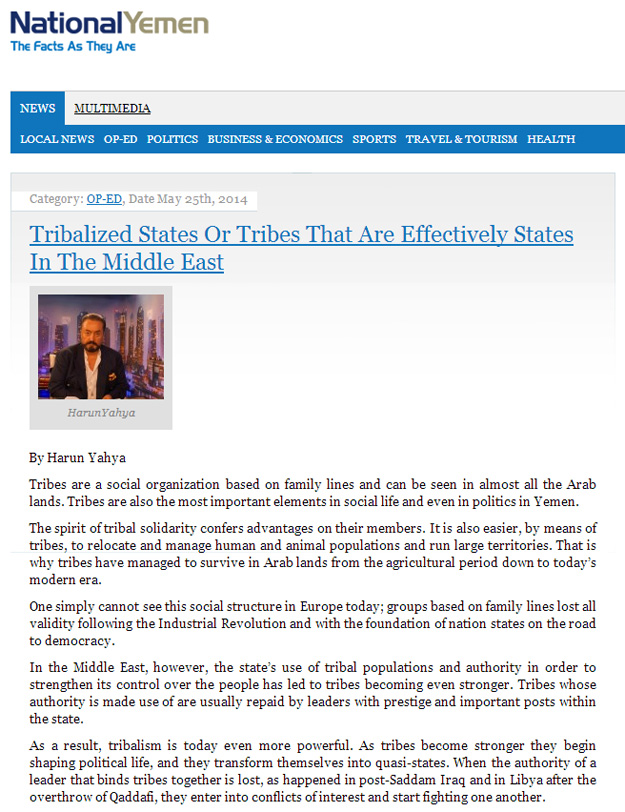
Tribes are a social organization based on family lines and can be seen in almost all the Arab lands. Tribes are also the most important elements in social life and even in politics in Yemen.
The spirit of tribal solidarity confers advantages on their members. It is also easier, by means of tribes, to relocate and manage human and animal populations and run large territories. That is why tribes have managed to survive in Arab lands from the agricultural period down to today’s modern era.
One simply cannot see this social structure in Europe today; groups based on family lines lost all validity following the Industrial Revolution and with the foundation of nation states on the road to democracy.
In the Middle East, however, the state’s use of tribal populations and authority in order to strengthen its control over the people has led to tribes becoming even stronger. Tribes whose authority is made use of are usually repaid by leaders with prestige and important posts within the state.
As a result, tribalism is today even more powerful. As tribes become stronger they begin shaping political life, and they transform themselves into quasi-states. When the authority of a leader that binds tribes together is lost, as happened in post-Saddam Iraq and in Libya after the overthrow of Qaddafi, they enter into conflicts of interest and start fighting one another.
One can see similar developments in Yemen, a part of the Middle East. Many party leaders are also leaders of the tribes they belong to. The overwhelming influence of tribes on the state is still continuing decades after the revolution of September 1962. For example, fifty-eight percent of the Yemeni parliament headed by Abdullah al Ahmar in 1969 consisted of tribal leaders. As the tribal leaders grow older, they are replaced by their children, and the system carries on. The influence of tribes is not limited to politics, by the way; important figures in the military are also leaders or members of tribes.
Tribes also try to increase their influence and power in an unjust manner by means of favoritism. Tribal leaders are generally even able to step outside party policies in order to strength their own influence. Every tribe can organize and protect its own territory, much like a nation-state. That leads to enormous competition in the country; that competition leads to divisions, and those divisions lead to various conflicts.
One can see two tribes with the same language, ethnicity or religion fighting to the death in Yemen. That of course means a serious breakdown in state authority in Yemen, as well as in peace and unity.
It is a violation of Qur’anic morality for members of Muslim tribes to be in conflict. Allah speaks of family relations, blood ties and tribes in the Qur’an, although Muslim unity is stressed as more important than all these. According to the Qur’an, all believers are brothers, no matter what their gender, race, color or tribe, and they have a duty to treat one another justly.
In the Qur’an, Allah commands believers to be united, to stand together in ranks against disbelief, to regard and love one another as brothers, to be compassionate, forgiving and protective toward one another and to strongly avoid fragmentation and division. Believers have a duty to be united according to the Qur’an. As stated in one verse:
Hold fast to the rope of Allah all together, and do not separate. Remember Allah’s blessing to you when you were enemies and He joined your hearts together so that you became brothers by His blessing. You were on the very brink of a pit of the Fire and He rescued you from it. In this way Allah makes His signs clear to you, so that hopefully you will be guided. (Surah Al ‘Imran, 103)
From this and similar verses, and from the Qur’an as a whole, we can see that Muslims have an obligation
- To be united;
- To be bound to one another with brotherly love and affection;
- Not to argue and fall out;
- To be one another’s friends and guardians;
- To watch out for and protect one another under all circumstances;
- To counsel one another;
- And to wage an intellectual struggle against denial in ranks like well-built walls.
Any contrary form of behavior, that is
- Being divisive instead of inclusive;
- Not treating one’s Muslim brothers with love and affection;
- Not being forgiving and protective toward one’s Muslim brothers;
- And not standing side by side with other Muslims in the intellectual struggle against denial is forbidden.
The Yemenis must abandon divisions and differences and remember the fact that all Muslims are “brothers.” They must act as a role model to the world with the moral values this spiritual brotherhood brings with it. The spirit of brotherhood between believers is a gift and a blessing from Allah; Yemenis must therefore give thanks to Allah for this blessing and not forget His command “not to separate.”
In verse 13 of Surat al-Hujurat, Almighty Allah states that He has created differences between people as a means for them to come to know one another, not as a source of conflict. Allah wants Muslims to compete in good deeds, not to fight each other because of their differences. Members of tribes in Yemen must begin at once working for the good of all Muslims. Only then can Yemen strengthen its democracy as a secure and prosperous country.
Adnan Oktar's piece on National Yemen:


